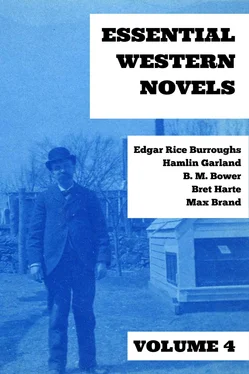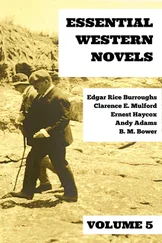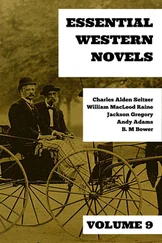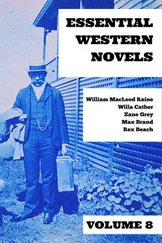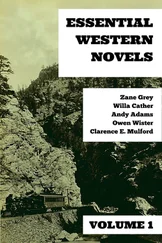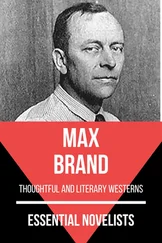He was sitting late one afternoon upon the front porch of the ranch house with some of his guests when a buckboard swung into sight on the dusty road that wound for miles through the property down to the railroad.
"Here comes the tenderfoot," said a man from Boston, who, three weeks previously, had never been west of Philadelphia.
"I hope he can play bridge," said a fat lady in khaki bloomers and high heeled shoes.
"I'm just hoping he can stay on a horse without help," said Blaine.
The buckboard that was approaching, drawn by a team of broncos, was the result of Cory Blaine's instinct for showmanship. He used it exclusively to transport his guests between the railroad and the ranch house, feeling that it lent an atmosphere that no automobile could induce.
The man who drove the buckboard was also a showman, as was evidenced by the magnificent style in which he drew up in front of the ranch house, covering the last two or three hundred yards at a gallop, setting the broncos on their haunches in a cloud of dust at the finish.
A couple of cowhands had sauntered over from the bunk house when the buckboard had first appeared in the distance; and as Bruce Marvel alighted, they were unroping his trunk at the back of the vehicle while they sized him up with inward contempt. All other eyes were upon the new arrival as Cory Blaine descended from the porch and took him by the hand.
"You'd be Mr. Marvel, I reckon," said Blaine.
"Yes," replied the newcomer.
"My name's Blaine," said the host. "I'm glad to meet you."
"Thanks," said Marvel.
"Have a good trip?"
"Yes, but a dirty one. I'd like to go to my room and clean up."
"Sure," said Blaine. "Come ahead. The boys will be right up with your stuff," and he led the way into the house, followed by his new guest.
"Here ye are," said Blaine, opening the door of a small box- like room. "Guess you'll find everything here you need. When yer done come on out and meet the rest of the folks. We feed at six o'clock. It's pretty near that now."
"By the way," said Marvel as Blaine was leaving, "shall I dress for dinner?"
"Aint you dressed now?" asked the other.
"I mean do the men wear dinner clothes?—tuxedos, you know."
Blaine tried to hide the pity in his heart as he explained that that was not at all necessary; but when he closed the door behind him he grinned; and upon the other side of the door his guest grinned, too.
"What do you suppose?" asked Blaine as he joined the others on the porch.
"What?" asked a girl in overalls.
"He wants to know if he should put on a spike tailed coat and a stove pipe hat for dinner."
"My God!" exclaimed a young woman, who was rigged up in an outfit that would have turned Tom Mix green with envy. "He's got a lot to learn."
"Perhaps," said the blond girl in overalls, "he is just trying to be himself and act natural. You know there are a lot of people who dress for dinner every night."
"When you are in Rome, do as the Romans do," said the man from Boston.
"Give him a chance," said the blond girl, "and don't forget that on the first camping trip we took after you arrived you brought along green silk pajamas."
"Oh, come now, Kay," he expostulated. "That's different."
"Did you notice his luggage?" said the Tom Mix girl. "Brand new and his clothes, too. He must have bought a whole new outfit just to rough it in."
"I hope he can play bridge," said the fat lady.
"I'll bet he plays ping-pong," said Bert Adams, the man from Boston.
"I think he is real nice looking," interjected Miss Pruell, Kay White's spinster aunt.
Twenty minutes later silence fell upon the company as Marvel came out onto the porch—one of those uncomfortable silences that may last but a moment and still seem endless.
This one Cory Blaine relieved by introducing Marvel to his other guests, and a moment later the clatter of an iron pipe on a metal triangle announced the evening meal.
At the long table Bruce Marvel found himself seated between Kay White, the blond in overalls, and Dora Crowell, the Tom Mix girl.
He had noticed the difference in the apparel of the two girls; and though he was duly impressed by the ornate trappings of Dora, he thought that the other girl somehow looked more genuine in her blue overalls pulled over high heeled boots, her denim workshirt, and a bandanna handkerchief knotted loosely about her throat. He surmised that she belonged here and this supposition prompted his first question.
"This is your home, Miss White?" he asked.
"It commences to look like it," she replied. "I have been here two months now, but my real home is in California."
"What time do we start tomorrow, Cory?" asked Adams.
"Almost any time you folks want to," replied Blaine. "The chuck wagon went on ahead today as far as Mill Creek. That's only about fifteen miles. I didn't want to make it too hard the first day."
"We're going on a lion hunt," Kay White explained to Marvel. "We had planned on leaving yesterday, but when Cory got your telegram he decided to wait so that you could go along with us."
"Can you ride?" demanded Dora Crowell.
"I guess I can manage," replied Marvel, "but I suppose these cow horses aren't much like polo ponies."
"Do you play bridge, Mr. Marvel?" demanded Mrs. Talbot.
"Do you play bridge here?" he asked.
"I can't get any one to play with me," complained the fat lady. "Those that play say they get enough of it at home."
"Well I suppose that's true," agreed Marvel. "What we want here is a change."
"Then I suppose you won't play with me either," whined Mrs. Talbot.
"We might get up a poker game," suggested Mr. Talbot.
"You would suggest that, Benson," snapped his wife. "You know I perfectly loathe poker."
"I wouldn't mind learning how to play poker," said Marvel.
"I reckon we'd be glad to teach you," said Cory Blaine with a wink at Talbot.
The buckboard that had brought Marvel had also brought the mail, and after supper the news of the day was the principal topic of conversation.
"Is there anything about the Gunderstrom murder in your paper, Cory?" asked Dora Crowell, and then to Marvel, who was near her, "I went to school with Mr. Gunderstrom's daughter in Philadelphia."
"They haven't found that fellow Mason yet," said Blaine. "He's been missing for three weeks—disappeared the day after the murder."
"You see," explained Dora to Marvel, "this man Mason was a neighbor of Gunderstrom's, and they'd been fighting over a piece of land for nearly twenty years."
"And they think Mason killed him?" asked Marvel.
"They know it," replied Dora. "A man called up the sheriff's office on the telephone and told them so."
"Mason was a deputy sheriff," explained Kay White, "and he took advantage of his office to pretend that he was looking for the murderer so that he could get away himself."
"Clever at that," commented Adams.
"A man who was well enough known to be a deputy sheriff ought not to be hard to find," commented Marvel.
"It says here in the paper," said Blaine, "that his horse showed up on the range a day or two ago; so that looks like he probably caught a train and beat it out of the country."
"He must be a terrible man," said Dora Crowell. "He shot poor Mr. Gunderstrom right through the heart as he lay asleep on his bed."
"Between the eyes," corrected Cory Blaine.
"It didn't say that in the paper," said Dora.
"Oh," said Blaine, "well, maybe it was in the heart."
Bruce Marvel rose. "What time are you starting in the morning?" he asked. "I think I'll be going to bed now."
"Breakfast at seven," said Blaine.
"Seven sharp," said Mr. Talbot.
"And we'll be leaving right after breakfast," said Blaine.
The entire party was assembled at the breakfast table when Bruce Marvel entered the dining room the following morning. Dora Crowell voiced an audible "My God" while Mrs. Talbot choked in an effort to control herself. Cory Blaine dissembled whatever surprise he felt, for it was his business not to notice the various eccentricities of dress evidenced by his guests, so long as they paid their bills.
Читать дальше
